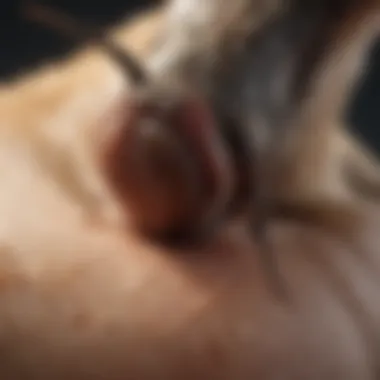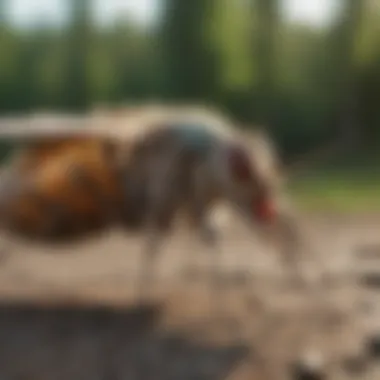Understanding Mosquito Bites in Dogs


Intro
Mosquito bites can have serious implications for dogs. Understanding how these bites affect our pets is crucial for their health and well-being. As outdoor activities increase, especially during warm months, so does the contact between dogs and mosquitoes. Bites can lead to various health issues, including skin irritation, allergic reactions, and transmission of diseases. This article provides a detailed examination of mosquito bites on dogs, exploring their effects and preventive measures, thus bringing awareness to dog owners.
Pet Care and Grooming
Importance of Regular Care
Regular care of a dog's skin and coat can reduce the risk of mosquito bites and related issues. Grooming minimizes the chances for insects to hide in fur, making it essential to establish a routine. Keeping the coat clean also helps maintain skin health, lowering the probability of infections if bitten.
Grooming Techniques by Pet Type
Grooming techniques can vary significantly among dog breeds. For example, long-haired breeds like the Golden Retriever require thorough brushing to prevent mats, while short-haired breeds, like the Beagle, need less frequent grooming. Understanding these differences allows pet owners to tailor their approach, ensuring optimal skin and coat health.
Tools and Products Recommendations
Using the right tools can enhance grooming effectiveness. Recommended tools include:
- Flea combs for removing parasites.
- Slicker brushes for detangling.
- Hypoallergenic shampoos for sensitive skin. Choosing quality products contributes to better care and comfort.
Seasonal Care Tips
During mosquito season, extra care is necessary. Bathing with insect-repellent shampoos can help. Additionally, regular checks for bites or skin irritations should be a priority. Access to clean water and shaded areas can provide comfort and safety.
Health and Nutrition
Understanding Pet Nutrition
A well-balanced diet is vital for dogs, supporting their immune system against insect bites. Foods rich in omega fatty acids can enhance skin health, making it more resilient. Additionally, ensure your dog receives all essential vitamins and minerals to maintain overall health.
Common Health Issues by Species
Some dogs may have predispositions to skin issues, which can worsen with mosquito bites. Breeds like the Bulldog and Dachshund may be more susceptible due to their skin folds, which can collect moisture and attract insects.
Preventive Care and Regular Check-Ups
Regular veterinary visits are essential for preventive care. Vaccinations and screenings can safeguard against diseases transmitted by mosquitoes. It's advisable to discuss vaccination options with a veterinarian, particularly in mosquito-prone areas.
Food and Dietary Advice
Consider adding supplements that support skin health. Fish oil is one popular option. Additionally, always monitor for allergic reactions to new foods, as these can compound issues caused by mosquito bites.
Behavioral Training
Basics of Positive Reinforcement
Training dogs to come indoors during peak mosquito activity can be beneficial. Use positive reinforcement methods to encourage behaviors that keep your dog safe, such as staying inside when mosquitoes are most active.
Training Techniques Users Can Apply
Utilize simple commands and cues to develop good habits. Teaching commands like "come" can be vital for getting your dog indoors swiftly. Consistency and patience are key to effective training.
Managing Behavioral Issues
Some dogs may exhibit anxiety or restlessness during mosquito season. Providing a calm environment and engaging toys can help alleviate stress. Understanding your dog’s behavior and responding with care ensures a more peaceful time together.
Importance of Socialization
Encouraging socialization with other dogs can also help. A well-socialized dog is often more adaptable to changes in their environment, like transitioning between inside and outside spaces.
Engaging Activities and Enrichment
Fun Games to Play with Your Pet
Engaging your dog in mentally stimulating activities can keep them entertained and lessen the urge to roam outside unmonitored. Games such as fetch or hide-and-seek can promote physical and mental stimulation.
DIY Toys and Activities


Creating DIY toys from everyday items can provide entertainment without high costs. Simple items like empty water bottles or old socks can become fun playthings with a little creativity.
Importance of Mental Stimulation
Providing mental challenges is essential. Puzzle feeders and training exercises can keep a dog's mind sharp while reducing anxiety about the outdoors.
Outdoor Adventures and Exploration
Exploring the outdoors can still be safe with precautions. Opt for outings during times when mosquitoes are less active, such as early mornings or after sunset. Ensuring your dog is on a leash allows for safer experiences in nature.
Resources and Community Engagement
Recommended Books and Websites
Several resources can expand your knowledge on pet care. Websites like britannica.com offer great insight into dog health. Books focusing on canine care can also be valuable.
Forums and Groups for Pet Owners
Engaging with other pet owners through platforms like reddit.com or Facebook can provide support and shared experiences relevant to canine care, especially regarding mosquito-related concerns.
Finding Local Services and Classes
Look for local services such as grooming or training classes that focus on preventive care. Many organizations offer workshops and information specific to your geographic location.
Encouraging Community Sharing and Contributions
Encouraging local communities to share tips and experiences regarding mosquito prevention can be beneficial. Social media groups can be an excellent way for dog owners to connect and share valuable insights.
Prelims to Mosquitoes and Dogs
Understanding the interactions between mosquitoes and dogs is crucial for every pet owner. Mosquito bites can have serious implications for canine health. This article provides insights into how these insects affect dogs, pointing out behaviors, potential health risks, prevention methods, and treatment options. A comprehensive view of this topic is necessary for ensuring the well-being of our pets. The threats posed by mosquito bites are quite significant, yet they often go unnoticed. By grasping the nuances of mosquito behavior and their effects on dogs, owners can take effective steps to protect their pets.
Overview of Mosquito Behavior
Mosquitoes are primarily active during dusk and dawn. They are drawn to warmth, moisture, and the carbon dioxide produced by mammals. Understanding these behaviors is vital in recognizing when dogs are most at risk of being bitten.
- Mosquitoes locate their targets through scent and temperature detection. This means they are more likely to bite animals that are moving or resting where they can easily access their skin.
- Common species that affect dogs include the Aedes, Anopheles, and Culex. Each type has distinct breeding habits; for instance, Aedes species tend to thrive in warm and humid environments.
- Mosquitoes complete their life cycle in stagnant water, necessitating that owners monitor areas around their households for any standing water to limit mosquito breeding.
Understanding these habits not only provides insight but also underscores the importance of timely measures to protect against mosquito bites.
Common Canine Reactions to Mosquitoes
Dogs can exhibit varied responses to mosquito bites, dependent on their individual sensitivity and the number of bites.
- Some canines may show mild itching or redness at the site of the bite, which is an indication of their body reacting to the mosquito saliva. The itching sensation can lead to scratching, which might escalate into further skin irritations.
- In more severe cases, dogs could experience allergic reactions. This condition may include symptoms like swelling, hives, or even difficulty breathing. Identifying these symptoms early can be critical for the health of the dog.
- Behavioral changes can also manifest. A dog may become anxious or restless as it tries to cope with the discomfort of bites.
Understanding how dogs react to mosquitoes can help owners recognize when their pets are in distress and enable them to take appropriate action.
Can Mosquitoes Bite Dogs?
The question of whether mosquitoes can bite dogs is significant as it highlights both the potential health risks to our pets and the behaviors that pet owners must navigate. While dogs do not have the same risks associated with mosquito bites as humans, their exposure to these insects can result in various health issues, including the transmission of diseases. Understanding the specifics of how mosquitoes interact with dogs can assist owners in taking preventive measures and ensuring their pets' well-being.
Physiology of Dog Skin
Dogs possess a unique skin structure that differs from humans. Their skin is generally thicker and covered with fur, which can influence how mosquitoes bite. The fur may offer some level of protection, but it does not completely shield the skin from a determined mosquito. The skin on certain areas of a dog's body, such as the belly and ears, is thinner and more vulnerable, making these spots more prone to bites.
Furthermore, a dog’s skin contains different layers, including the epidermis and dermis, which can react to mosquito bites in various ways. When bitten, a dog's skin may swell or become irritated. Understanding the anatomy of dog skin is essential for recognizing how mosquito bites impact them and informing appropriate treatments.
Frequency of Mosquito Biting Dogs
The frequency with which mosquitoes bite dogs can depend on several factors. First, the geographic location plays a crucial role. Areas with warmer climates tend to have higher mosquito populations. Furthermore, seasonality affects mosquito activity, with warmer months seeing an increase in their numbers.
Factors influencing mosquito biting frequency include:
- Time of Day: Mosquitoes are often more active during dawn and dusk.
- Dog Activity: Dogs that spend time outdoors are more likely to encounter mosquitoes.
- Size and Color of the Dog: Certain colors attract mosquitoes more than others, and larger dogs may have a higher likelihood of being bitten simply due to their size.
Pet owners should monitor their dog's outdoor exposure, especially during peak mosquito hours, to minimize the chances of biting incidents.
Health Risks Associated with Mosquito Bites


Understanding the health risks associated with mosquito bites is crucial for dog owners. These risks can have significant impacts on canine health and, by extension, the well-being of the entire household. Being aware of these risks allows pet owners to take necessary precautions and seek appropriate treatments. This essential knowledge forms the foundation for a responsible approach to pet care during mosquito season.
Diseases Transmitted by Mosquitoes
Mosquitoes are known vectors for several dangerous diseases that can affect dogs. Knowing these diseases can help dog owners be vigilant and proactive in protecting their pets.
Heartworm Disease
Heartworm disease is a severe condition caused by parasitic worms living in the dog's heart and blood vessels. It leads to significant health complications and can be fatal if untreated. The unique aspect of heartworm is that it developes over months inside the host animal. This prolonged incubation often means that symptoms may go unnoticed until the disease has advanced.
Key characteristic of heartworm disease is its preventability. Many effective heartworm preventives exist, making it a crucial focus for dog owners. Ignorance about this disease can lead to dire consequences for affected pets. Moreover, the treatment for heartworm disease is often expensive and can be risky. This highlights the importance of regular preventive measures, such as medications and annual checks by a veterinarian.
West Nile Virus
West Nile Virus is another disease transmitted by mosquitoes, primarily affecting birds but also capable of infecting dogs. Exposure to infected mosquitoes places dogs at risk, although it's less common than in humans. The disease can lead to neurological issues in infected animals. One significant concern is the lack of a specific treatment for West Nile Virus in dogs. This makes prevention essential. Understanding the implications of this virus can steer dog owners to take proactive steps, like reducing mosquito exposure, especially in peak seasons.
Eastern Equine Encephalitis
Eastern Equine Encephalitis (EEE) is a viral disease that can also affect dogs, although it is rare. The disease is severe and can result in inflammation of the brain. The fairly high mortality rate associated with EEE makes it a critical concern. One must regard the fact that prevention is the key, as treatment options are limited. Regular veterinary checks and avoiding areas with high mosquito activity can help mitigate these risks.
Allergic Reactions in Dogs
Mosquito bites can cause allergic reactions in some dogs, leading to discomfort and additional health issues. Understanding symptoms of allergies can aid in quicker responses to alleviate a pet's suffering.
Symptoms of Allergies
Allergic reactions to mosquito bites may manifest in various ways. These include scratching, redness, swelling, or bumps at the bite site. Some dogs may also experience more generalized reactions, such as vomiting or lethargy. Recognizing these symptoms allows pet owners to take timely action. Dogs may exhibit some odd behaviors like increased agitation or distress, signaling discomfort. As such, it is essential to watch for these signs and consult with a veterinarian when necessary.
Treatment Options
When a dog experiences allergic reactions from mosquito bites, several treatment options are available. Over-the-counter antihistamines can provide relief, but consulting a veterinarian is advisable before administering any medication. In more severe cases, prescription medications or topical treatments may be necessary. These treatment options highlight the importance of being proactive in managing a dog's health. A veterinarian can also provide guidance on long-term strategies for minimizing allergic reactions to mosquito bites.
Behavioral Changes in Dogs Due to Mosquito Bites
The interaction between mosquitoes and dogs extends beyond just physical discomfort. Understanding the behavioral changes that occur due to mosquito bites is crucial for dog owners. When a dog experiences discomfort from mosquito bites, it can lead to significant alterations in its behavior. Recognizing these changes allows owners to respond appropriately, ensuring the well-being of their pets.
Agitation and Anxiety
A dog that suffers from mosquito bites may exhibit signs of agitation and anxiety. These symptoms can manifest in various ways, including restlessness or excessive barking. Agitation can arise from the irritation caused by the bites, making the dog feel uneasy. In addition, if the bites lead to further health issues, the dog's stress levels may increase.
Some common signs of agitation in dogs include:
- Pacing or inability to relax
- Whining or vocalizing frequently
- Constantly seeking attention from their owner
It is important to note that a dog's temperament can also influence how it reacts to bites. More sensitive dogs might show higher levels of anxiety compared to others. If these signs persist, it may be necessary to explore calming solutions. This can involve creating a quieter environment or engaging in reassuring activities with the pet.
Scratching and Skin Irritation
Another significant behavioral change seen in dogs after mosquito bites is scratching and skin irritation. The bites can lead to localized inflammation, prompting the dog to scratch more frequently. This behavior may stem from the dog's instinct to relieve the irritation, but excessive scratching can further compound the problem by causing injuries or infections.
When dogs scratch, they may:
- Create open wounds that can become infected
- Expose themselves to secondary skin issues
- Encourage biting or licking in the affected areas
It is essential for pet owners to monitor how much their dogs are scratching. If the behavior becomes excessive, addressing the root cause is important. This can involve using treatments to alleviate itching or consulting a veterinarian to rule out any serious complications.
Recognizing behavioral changes in dogs due to mosquito bites helps owners provide timely interventions and care, ensuring pets remain comfortable and healthy.
Preventive Measures Against Mosquito Bites
Preventing mosquito bites on dogs is not just a matter of comfort; it is vital for the overall health and well-being of pets. Mosquitoes can transmit severe diseases, and taking proactive measures can reduce these risks significantly. In this section, we will discuss how to avoid mosquito habitats, the utility of various repellents, and vaccination strategies to keep your canine companions safe.
Avoiding Mosquito Habitats
Eliminating environments that attract mosquitoes can be an effective step in keeping dogs protected. Mosquitoes thrive in areas with standing water. Regularly check your yard for such locations and eliminate them by removing any stagnant water from pots, buckets, and other containers. Another critical approach is to maintain your garden. Keeping grass and bushes trimmed can limit the shady spots where mosquitoes rest. Moreover, ensuring good drainage can minimize water accumulation, thus deterring mosquito breeding.
Use of Mosquito Repellents
Using mosquito repellents can provide significant assistance in preventing bites on dogs. However, choosing the right type of repellent is essential for effectiveness and safety.


Natural Repellents
Natural repellents are an appealing option for many pet owners. They are often made from essential oils like citronella, eucalyptus, and lavender. These ingredients are known for their ability to deter mosquitoes without harmful chemicals. The key characteristic of natural repellents is that they are generally considered safer for pets and the environment. Many owners appreciate that they minimize exposure to synthetic chemicals. However, the unique feature of natural repellents is their variable effectiveness. While they can be beneficial, results may vary, and they might need frequent reapplication, especially in humid conditions.
Commercial Products
Commercial products are another avenue for preventing mosquito bites. These products often contain synthetic ingredients designed to repel mosquitoes effectively. Many of these products are well-researched and have proven effectiveness against various types of mosquitoes. These repellents save time and effort, providing prolonged protection compared to natural options. However, pet owners should choose products specifically formulated for dogs to avoid adverse reactions. Always read the labels carefully before use and consult with a veterinarian to ensure they are appropriate for your pet.
Vaccinations and Preventive Treatments
Vaccinations and preventive treatments should also be discussed in the context of mosquito protection. Specific vaccinations can help prevent diseases transmitted by mosquitoes, such as heartworm disease. Monthly preventive treatments can also provide additional protection for dogs against heartworm and other parasites. Consistent check-ups with a veterinarian ensure that dogs remain current on their preventive care and vaccinations. This step is crucial to minimizing risks associated with mosquitoes. The combination of good hygiene practices, effective repellents, and regular veterinary visits create a comprehensive strategy for keeping dogs safe from the impacts of mosquito bites.
Home Remedies for Mosquito Bites on Dogs
Mosquito bites can cause discomfort for dogs, just like for humans. Understanding home remedies is important for pet owners. These remedies can provide relief and healing without the side effects common in some medications. By applying these natural solutions, owners can offer comfort and support their dogs' recovery.
Cooling Treatments
Cooling treatments are among the most effective remedies for alleviating discomfort from mosquito bites in dogs. These methods aim to reduce swelling and provide a soothing effect on the affected areas. Here are some suggestions for cooling treatments:
- Cold Compress: Gently applying a cold compress to the bite area for 10-15 minutes can help reduce swelling and numb the pain.
- Ice Packs: Wrapped in a cloth, ice packs can also be used. Apply them similarly to the cold compress.
- Aloe Vera Gel: This natural remedy has cooling properties. Aloe vera application can soothe the skin and may also aid in healing.
It's important to monitor your dog while applying these treatments. Avoid direct contact between ice and skin to prevent frostbite.
Natural Anti-itch Solutions
Natural anti-itch solutions can relieve the itching caused by mosquito bites effectively. When using these remedies, pet owners should ensure that the ingredients are safe for dogs. Here are several common natural anti-itch solutions:
- Oatmeal Baths: Colloidal oatmeal can calm irritated skin. Soaking your dog in an oatmeal bath can provide relief.
- Apple Cider Vinegar: Diluted with water, apple cider vinegar can work as a natural antihistamine. Apply the mixture gently to the affected area with a cotton ball.
- Baking Soda Paste: A paste made from baking soda and water can also provide relief. Spread the paste on the bite, let it sit for a few minutes, then rinse off.
Always test a small area for skin reactions before using any new remedy on your dog.
When to Consult a Veterinarian
Consulting a veterinarian is a critical step in ensuring your dog's health after mosquito bites. Understanding when to seek professional advice can make a significant difference in your pet's recovery and overall well-being. Several factors should prompt a visit to the vet, particularly if you notice any concerning signs following a mosquito bite.
Identifying Serious Symptoms
Not every mosquito bite results in health issues, but some symptoms should raise alarms. Here are signs that may indicate more serious reactions or complications:
- Increased swelling or redness around the bite site.
- Excessive scratching that disrupts normal behavior.
- Signs of infection, such as discharge, warmth, or a foul odor.
- Changes in appetite or refusal to eat.
- Lethargy or unusual behavior indicating discomfort.
If you see your dog exhibiting any of these symptoms, it’s wise to contact your veterinarian quickly. Early intervention can prevent more serious health implications, such as the spread of infections or diseases.
Always trust your instincts. If something feels off with your pet, consult a vet regardless of whether it you think it's related to a mosquito bite.
Routine Check-ups and Mosquito Prevention
Regular veterinary check-ups are essential to maintain a dog's health, especially in regions where mosquitoes are prevalent. These visits not only help in early detection of any disease but are also vital for preventive care.
During these check-ups, the veterinarian may recommend:
- Vaccinations against mosquito-borne diseases such as heartworm.
- Discussing mosquito repellents suitable for your dog.
- Addressing lifestyle factors like yard maintenance to reduce mosquito populations.
- Evaluating your dog’s overall health to better understand how it may react to insect bites.
Keeping a consistent veterinary schedule enhances your ability to protect your canine friend from the harms that mosquitoes can pose. Understanding both immediate signs and long-term preventive measures increases the chances of maintaining your dog’s health and happiness.
Finale
The conclusion of this article highlights the critical importance of understanding the implications of mosquito bites on dogs. It delves into various health risks that can arise from these bites, providing dog owners with a clearer view of what to look for and how to respond. Acknowledging that mosquitoes can transmit serious diseases, knowing the symptoms can contribute significantly to a dog’s well-being. It is vital to grasp that prevention and timely treatment are key to safeguarding canine health.
Summarizing Health Implications
In summary, dog owners must recognize that mosquito bites can pose serious threats to their pets. Diseases such as heartworm disease and West Nile virus are particularly concerning. The symptoms may vary widely, but they often include lethargy, coughing, and unusual behaviors. These indicators should be taken seriously. Moreover, allergic reactions to bites can lead to chronic discomfort for dogs.
- Heartworm Disease: Caused by infective larvae transmitted through mosquito bites, it can have severe consequences if not caught early.
- West Nile Virus: While it is rarer, it remains a health threat.
- Allergic Reactions: Varying from mild itchiness to severe reactions, these can necessitate veterinary intervention.
Pet owners should monitor for these health implications closely. If a dog shows persistent symptoms following a mosquito bite, prompt veterinary consultation is strongly advised. This proactive approach can mitigate risks and ensure that any health issues are addressed swiftly.
Next Steps for Pet Owners
For responsible pet ownership, there are several steps that dog owners can take to protect their pets from mosquito bites. Implementing preventive measures is essential. Here are some suggestions:
- Limit Outdoor Time: Especially during peak mosquito activity hours at dawn and dusk.
- Use Repellents: Research reliable mosquito repellents designed specifically for dogs. Certain natural options may also be effective.
- Regular Vet Visits: Keep up with routine veterinary care, including vaccinations if needed. Regular check-ups can catch potential problems early before they escalate.
Ultimately, understanding the risks associated with mosquito bites empowers pet owners to act decisively. By following recommended preventive measures and being vigilant about their dogs' health, owners can significantly reduce the risks mosquitoes pose. Education is paramount, as informed decisions lead to healthier, happier pets.















